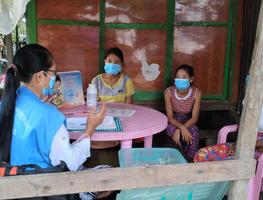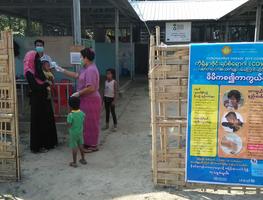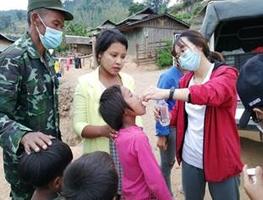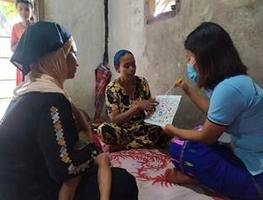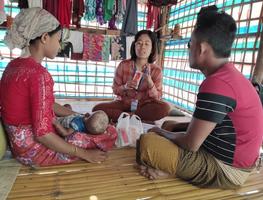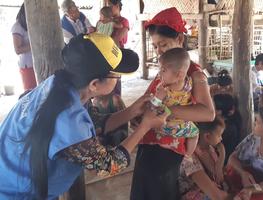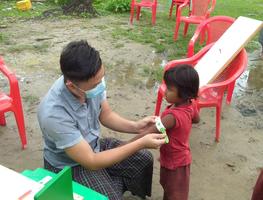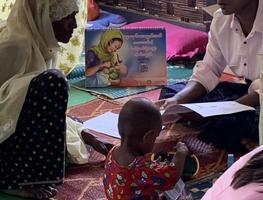Request support on coordination, information management, integration for nutrition outcomes or technical nutrition in emergencies assistance.
التماس الدعم لتنسيق التغذية وإدارة المعلومات والتغذية في حالات الطوارئ
Demander un appui pour la coordination de la nutrition, la gestion de l'information et la nutrition dans les situations d'urgence
Buscar apoyo para la coordinación de la nutrición, la gestión de la información y la nutrición en situaciones de emergencia
Solicite apoio para coordenação em nutrição, gestão de informação e nutrição em emergências
Myanmar
Coordination mechanism: Cluster-
Year of activation: 2021
NCC: UNICEF P3 FT
Deputy: Deputy Nutrition Cluster Coordinator Recruited
IMO: UNV Recruited
Other: UNICEF NOB and NOC Nutrition Officers
Coordination leadership at the national level: UNICEF
Sub-national coordination: 4 sub-national cluster platforms led by UNICEF and/or selected NGOs in the states of Rakhine, Northeast, Southeast and Northwest
Year-End report
January to December 2023
-The humanitarian sector in Myanmar continues to face a restrictive humanitarian operating space through various means. Among the most devastating is the non-issuance of travel authorizations to humanitarian actors by the de facto authorities and therefore curtailing humanitarian response activities.
Additionally, the requirement for humanitarian actors to register and be in compliance with the NGO legislative law will further limit humanitarian players from accessing the needy particularly those in hard-to-reach areas some of whom are controlled by non-state actors. Conflict and concomitant displacements, multiple roadblocks that restrict movement of humanitarian supplies will continue to place impediments to timely delivery of humanitarian aid.
-There is a chronic lack of updated and representative nutrition focused assessment results in Myanmar. This makes it difficult to assess the extent of malnutrition in the country, hamstrung efforts to advocate for funding/ gauge any progress being made from the partners' response efforts and calculation of people in need for the HRP.
The conflict in Myanmar is increasing and causing a lot of displacements past the one and half million mark more than 60 percent of whom are in the Northwest. Additionally, the continued conflict has affected accessing the hard to reach and underserved communities and this worsened by denial of travel authorization by the authorities in the country/ increasing movement restrictions.
Funding for the HRP in Myanmar is sub-optimal by the end of 2022 HRP, just 14 percent of the projected financial needs were funded. The current level of funding the Nutrition Cluster slightly improved when compared to 2022 HRP to 16,1 percent of the total requirement.
Myanmar faces a yet unresolved non-issuance of tax exemption certificate for the importation of life-saving therapeutic supplies. There remains a risk of pipeline breakdown in Myanmar as the tax exemption certificate creates an unpredictable lead time to supplies importation.
- Limited resources and capacities of partners for nutrition in emergency response require competency-based training, coaching and mentoring
| Advocacy Survey | |
| Country Advocacy Strategy developed | No |
| Link to document | Link |
| Advocacy activities included in annual work plan | No |
| Specific WG leading advocacy work established | No |
| Preparedness | |
| Contingency plan or ERP plan developed/updated | Yes |
| Link to document | Link |
| Intersectoral Collaboration (ISC) | |
| Intersectoral projects currently under implementation | Yes |
| Clusters engaged | |
| The Nutrition Cluster closely collaborated with the other clusters within the inter-cluster coordination group through holding regular meetings, update on the humanitarian situation and advocated for the needs in Myanmar either jointly or individually. The dearth of current and representative assessment results in Myanmar also enabled the Nutrition Cluster to collaborate within the ICCG to undertake the Multi-Sector Needs Analysis (MSNA) in order to accurately assess the needs of the humanitarian situation in the country. Apart from this collaboration, the Nutrition cluster led in the establishment of a unique strategic advisory group plus (SAG+) which brings together all the humanitarian nutrition actors and actors in the development sector including SUN movement players. This has been done to strengthen the humanitarian development nexus and subsequent engagements will ensure the nexus is strengthened. Accountability to Affected Populations is also an area where the nutrition cluster is working across sectors to ensure cross-sectoral response and meeting the multiple needs of vulnerable communities. Finally, response to internally displaced persons in the Southeast Region has also been a platform where the cluster support a multi-faceted response approach to IDPs and therefore contributing to their wholesome needs being met. | |
Key Figures
(million)Funding
(million)- Children 6-59 months
- Pregnant and Lactating Women
Nutrition Partners
Total Partners

